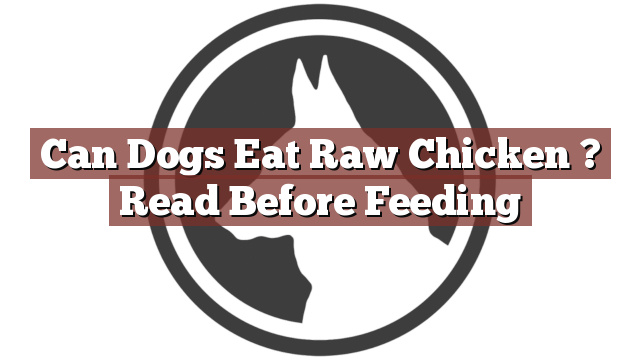Understanding Your Dog’s Dietary Needs
As a responsible dog owner, it is crucial to understand the dietary needs of your furry companion. Dogs are omnivores, which means they can eat a variety of foods including meat, grains, and vegetables. However, their digestive system and nutritional requirements differ from humans. While some human foods may be safe for dogs, others can be harmful or even toxic.
Can Dogs Eat Raw Chicken? Read Before Feeding
Can dogs eat raw chicken? This is a common question among dog owners considering a raw diet for their pets. The answer is yes, dogs can eat raw chicken, but there are important factors to consider before feeding it to them. Raw chicken can be a valuable source of protein and other essential nutrients for dogs. However, it is crucial to take precautions to ensure safety and minimize the risks associated with feeding raw chicken to dogs.
Pros and Cons of Feeding Raw Chicken to Dogs
Feeding raw chicken to dogs has both pros and cons. On the positive side, raw chicken is a natural source of protein and contains essential amino acids that are beneficial for a dog’s overall health. It can also provide necessary vitamins and minerals such as B vitamins, iron, and zinc. Additionally, some dog owners claim that a raw diet can lead to a shinier coat, healthier skin, and increased energy levels in their pets.
However, there are potential risks involved in feeding raw chicken to dogs. One of the main concerns is the risk of bacterial contamination, such as Salmonella and Campylobacter. These bacteria can cause food poisoning in both humans and dogs. Another risk is the possibility of bones splintering and causing choking or internal injuries. It is important to note that dogs have different digestive systems than wolves, their wild ancestors, and may not handle raw food in the same way.
Conclusion: Weighing the Risks and Benefits of Raw Chicken for Dogs
In conclusion, while dogs can eat raw chicken, it is essential to carefully consider the risks and benefits before incorporating it into their diet. If you choose to feed raw chicken to your dog, ensure that it is sourced from a reputable supplier, properly handled, and thoroughly cleaned. It is also recommended to consult with a veterinarian to create a balanced and nutritious diet plan for your furry friend.
Remember that every dog is unique, and what works for one may not work for another. Some dogs may have specific dietary restrictions or sensitivities that make raw chicken unsuitable for them. Always monitor your dog’s health and consult a veterinarian if you have any concerns about their diet. By making informed decisions about your dog’s food, you can ensure their overall well-being and happiness.
Thank you for taking the time to read through our exploration of [page_title]. As every dog lover knows, our furry friends have unique dietary needs and responses, often varying from one canine to another. This is why it's paramount to approach any changes in their diet with caution and knowledge.
Before introducing any new treats or making alterations to your dog's diet based on our insights, it's crucial to consult with a veterinarian about [page_title]. Their expertise ensures that the choices you make are well-suited to your particular pet's health and well-being.
Even seemingly harmless foods can sometimes lead to allergic reactions or digestive issues, which is why monitoring your dog after introducing any new food item is essential.
The content provided here on [page_title] is crafted with care, thorough research, and a genuine love for dogs. Nevertheless, it serves as a general guideline and should not be considered a substitute for professional veterinary advice.
Always prioritize the expert insights of your veterinarian, and remember that the health and happiness of your furry companion come first.
May your journey with your pet continue to be filled with joy, love, and safe culinary adventures. Happy reading, and even happier snacking for your canine friend!

